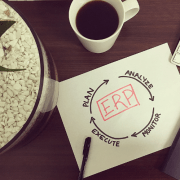The Four Keys To A Successful ERP Implementation
It is no secret that enterprise resource planning (ERP) systems are likened as the nucleus of an organization – touching every aspect of business from logistics to accounting. It goes without saying that one of the most important projects within your business is implementing an ERP system. Kevin Beasley, CIO at VAI and Forbes Council Member, has had many experience in helping companies with their ERP systems. In this article he shares four keys to a successful ERP implementation.
- Build in time for planning and information gathering. “Every business is different, even in the same industry. The early information-gathering process is crucial and should be painstakingly meticulous to avoid costly mistakes and delays down the road. Aspects of the planning process include whether the go-live date will occur on a rolling basis based on location or involve the entire organization or application-based implementations.”
- Get the culture and people questions right. “ERP implementations have big impacts on employees’ jobs. For some, it’s a time of opportunity because they see mastery of the system as a source of job enhancement. For others, a new ERP means changes in long-standing roles and responsibilities. Managers and executive teams need to get the requirements and questions right to facilitate an implementation plan that leads to employee buy-in and long-term success.”
- Test, test and test again. “The changeover from one system to another isn’t like turning a key. Implementation involves a series of data conversion tests. Organizations should couple this testing with documentation to help explain any anomalies.”
- Set a goal and stick to it. “It happens—organizations begin the process of installing a new ERP and then run into a challenge. Sometimes, a seemingly innocuous detail, overlooked during the planning phase, complicates implementation. Sometimes, the organization decides to change course, adding new features or realigning certain aspects of the business.”
A successful ERP implementation should have an implementation team and a reliable project manager to oversee the project from beginning to end. Beasley notes that the right project managers have unique insight into the processes and problem-solving skills that are invaluable when navigating the many intricacies of ERP implementation projects. “Having or bringing in such specialized expertise can turn what could be a daunting task of ERP implementation into a strategic advantage that positions a company for future success,” he says, “allowing it to harness the full potential of its new system now and into the foreseeable future, as well as enabling a competitive advantage.”




Leave a Reply
Want to join the discussion?Feel free to contribute!